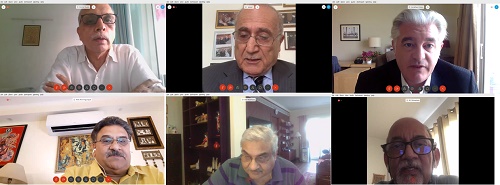

The Vivekananda International Foundation organised a virtual interactive session on the subject, “Developments in West Asia” on 13 July 2020. Dr Arvind Gupta, Director, VIF delivered his opening remarks and introduced the central topics, i.e. Geopolitics of Oil and Impact of COVID-19 on Regional Economies and Increasing Footprint of China in West Asia and implications for the Indo-Pacific. Dr. Jawad Alnani, Former Deputy Prime Minister of Jordan; Prof. Jonathan Fulton, Zayed University, Abu Dhabi and Amb Anil Trigunayat, Distinguished Fellow, VIF participated in the discussion.
Globally, the dynamics of oil is shifting. The US in the current period has emerged as one of the largest producers of oil. Moreover, states such as Iran and Venezuela with surplus production are unable to access markets due to international sanctions. The historic low prices of oil have led to sub zero economic situation and Persian Gulf states are facing fiscal deficit. For Saudi Arabia, the largest oil exporting state, the difficulties have been compounded by the cost of war in Yemen and crucially the COVID-19 pandemic.
The pandemic has impeded the efforts of the Gulf States to diversify its rentier economy due to the slowdown in economic activities. The Gulf States facing dire crisis may prioritise localisation of jobs that may affect the labour exporting states including India. The traditional position of Gulf States as exporter of capital, oil and raw materials and importers of finished products and labour are unravelling during the present crisis.

In terms of inter-Arab relations, the capital surpluses of the Gulf States have depleted and the past pattern of capital exports to poorer Arab states is likely to decline. Moreover, the economic recession has severely impacted the employment status of Arab workers in Gulf States. In this context, Jordan is keen to optimally utilise the human capital. It is looking for cooperation with India especially in the field of Information Technology. Labour exporting states within the region such as Egypt and Jordan are therefore opting to reorient its focus on new markets and creating new jobs domestically. The main driver in several Arab economies is the public sector. The economic glut would push the governments to widen the entry of the private sectors. Therefore, innovative ways to finance new projects including implementation of new financial engineering tools would be pertinent to overcome the current crisis.
The unipolar global order is witnessing a transition towards a more multi-polar world. The US continues to occupy the dominant position in the security sphere in the region. However, the uncertainty within the US leadership has affected the dynamics with its allies. In order to understand the US dynamic in the Persian Gulf region, it is pertinent to note that the mutual relations is not value based but rather interest based tracing to the Cold War construct, global geopolitics and US control over oil and energy channels. The prominence of these factors has receded in the current period impacting the present trajectory of the US involvement in the region.
Prior to Donald Trump administration, the US under Barak Obama was keen to reduce the footprint in the region. The Middle East Strategic Alliance is also aimed at pushing the regional players to proactively contribute towards their own security rather than relying on the US. The Gulf States as a result of shift in the US’ ‘interest based’ approach are looking for new options. Iran at the same time is responding to the US’ maximum pressure strategy by trying to look for alternative means to sustain the economy and actively contribute to reduce the US’ footprint in the region.
In the changing context, China has adopted a well thought out approach to penetrate in the region through the Belt and Road initiative. China has pursued a differentiated approach on sub-regional level. For China, the Gulf States occupy the predominant position based on considerations of energy, trade, investments etc. China in the recent years has gained several construction agreements to compliment the economic diversification programmes adopted by the Gulf States. China during the COVID-19 crisis has also used health diplomacy as an effective tool to increase cooperation in the region. It has partnered with local firms in the region in the sphere of testing, tracing and development of vaccine.
The lack of core security interests in the Gulf region in terms of maritime and land disputes have been beneficial for China. China at the same time has developed mutually benefitting relations with Iran. The Gulf States rather than pressuring China to reduce its engagement with Iran have offered incentives to attract economic engagement. It is seen as a security policy by Gulf States in which China would be keen to protect its assets and use its leverage to contain an aggressive Iran.
China under the guise of commercial activities is expanding its footprint in the Persian Gulf, Red Sea and the Mediterranean Sea. It is therefore seeking to create a physical architecture. In case of strategic competition, the US could pressurise its allies. However, it is unlikely that it would offer the similar economic incentives. The discussants opined that it would be naive to assume that China’s engagement is transactional. In fact, it is trying to pursue an ‘under the radar’ approach to solidify its strategic presence in the region while avoiding US antagonism.
From India’s perspective, the West Asian region is considered as the extended neighbourhood. However, China’s inroads could pose challenge for India’s interests in the region.
Links:
[1] https://www.vifindia.org/event/report/2020/july/18/developments-in-west-asia
[2] https://www.vifindia.org/author/hirak-jyoti-das
[3] http://www.facebook.com/sharer.php?title=Developments in West Asia&desc=&images=https://www.vifindia.org/sites/default/files/Developments in West Asia.jpg&u=https://www.vifindia.org/event/report/2020/july/18/developments-in-west-asia
[4] http://twitter.com/share?text=Developments in West Asia&url=https://www.vifindia.org/event/report/2020/july/18/developments-in-west-asia&via=Azure Power
[5] whatsapp://send?text=https://www.vifindia.org/event/report/2020/july/18/developments-in-west-asia